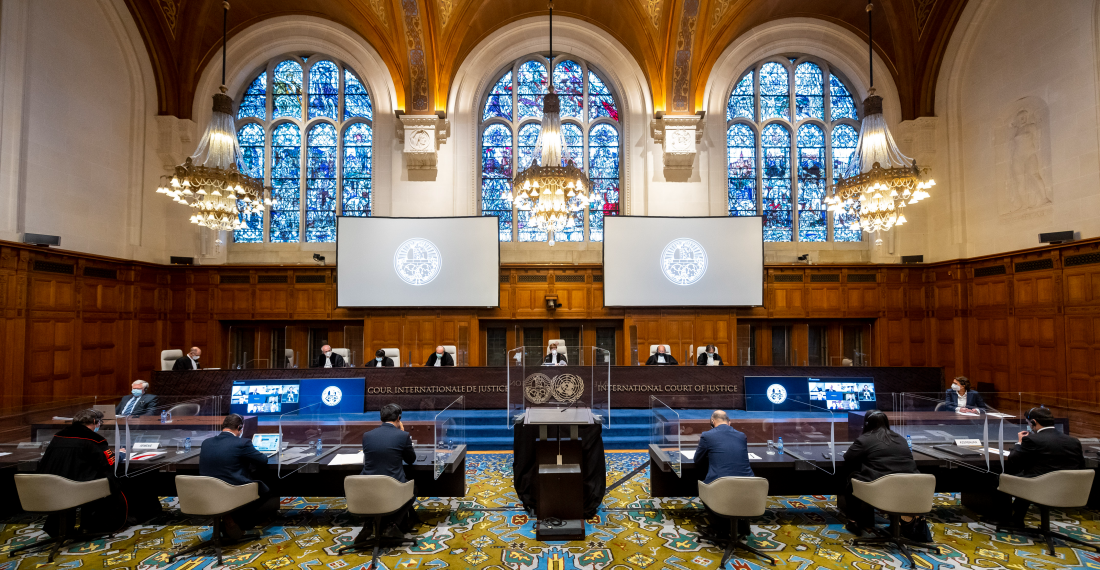Representatives of Azerbaijan and Armenia met at the The International Court of Justice in The Hague for the second day running on Tuesday (31 January) to discuss Azerbaijani claims of Armenia impeding demining efforts in Nagorno-Karabakh.
Both countries have taken the other to the International Court of Justice in competing cases concerning developments surrounding Nagorno-Karabakh. Tuesday's hearing followed a discussion the day before on Armenian claims of an Azerbaijani blockade on the Lachin corridor, and concerns about a humanitarian crisis in the Armenian-populated region.
As was the case on Monday's hearing, the Azerbaijani delegation was led by Elnur Mammadov, Deputy Minister for Foreign Affairs, and the Armenian delegation was led by Yeghishe Kirakosyan, a Representative of the Republic of Armenia on International Legal Matters.
The Azerbaijani delegation made two requests of "provisional measures" from the Court, namely:
1. "Armenia shall immediately take all necessary steps to enable Azerbaijan to undertake the prompt, safe and effective demining of the towns, villages, and other areas to which Azerbaijani civilians will return in the Lachin District, Kalbajar District and other formerly occupied districts of Azerbaijan, including by providing information about the location, quantity, type and characteristics of landmines, booby traps and other explosive devices in these areas, in order to enable Azerbaijani internally displaced persons to return to their homes."
2. "Armenia shall immediately cease and desist from any further efforts to plant or to sponsor or support the planting of landmines and booby traps in these areas to which Azerbaijani civilians will return in Azerbaijan’s territory, including, but not limited to, the use of the Lachin Corridor for this purpose."
The Azerbaijani argument
In his opening remarks at 10am, Elnur Mammadov spoke about the continued discovery of "new landmines" in Azerbaijan since December 2021. He said:
"since the Court’s 7 December 2021 Order, Azerbaijan has discovered over 2,700 new landmines, manufactured in Armenia in 2021, laid in Azerbaijan’s territory — including over 1,600 mines planted in or near civilian areas far from the Azerbaijan–Armenia border, to which displaced Azerbaijanis are returning. Azerbaijan also found booby traps, hidden in houses belonging to Azerbaijanis prior to Armenia’s occupation and built with trip wires to kill or maim any Azerbaijanis returning home."
Mammadov also spoke about the details of some of victims, saying:
"Since 10 November 2020, when the Trilateral Statement signed by Azerbaijan, Armenia and the Russian Federation agreeing to the cessation of hostilities came into effect, 282 Azerbaijanis have been either injured or killed by explosive devices planted in or around the territories that Azerbaijan liberated from Armenia’s occupation have been killed and a further 86 civilians injured by landmines. Among the victims are Azerbaijanis violently expelled by Armenia 30 years ago seeking to return home, as well as Azerbaijani workers engaged in demining and rebuilding the territories devastated by Armenia’s occupation. The victims are women and men, young and old — from an 11-year-old boy tending cattle, to a 64-year-old man visiting a family member’s grave."
The Armenian argument
After an adjournment, the sitting resumed at 4pm whereupon Yeghishe Kirakosyan of Armenia delivered his counterargument rejecting the Azerbaijani claim, and describing it as "yet another transparent attempt to deflect attention from its own wrongdoing". He said:
"Armenia has laid mines on its own sovereign territory for purely defensive purposes. Armenia has done so in the light of Azerbaijan’s repeated acts of aggression, including most recently in September 2022 [...] Armenia does not lay mines outside its sovereign territory, let alone in civilian areas in a counter-intuitive and implausible attempt to target Azerbaijani civilians on the basis of race. Armenia has not, and does not set boobytraps ever, anywhere at all. Azerbaijan has raised such accusations repeatedly, and they have been repeatedly refuted."
Kirakosyan also accused Azerbaijan of fabricating evidence, saying:
"The reality is that, as Armenia’s counsel will explain, Azerbaijan collected the landmines about which it complains from Armenian sovereign territories occupied by its own armed forces in 2021 and 2022. Azerbaijan is therefore seeking to use mines it collected following its own unlawful acts of aggression to manufacture a false evidentiary basis to support its request."
The Court’s decision on the provisional measures will be delivered at a public sitting, the date of which will be announced in due course.
A verbatim record of the morning's and the afternoon's proceedings can be accessed here and here, respectively. The corresponding press release can be accessed here.



